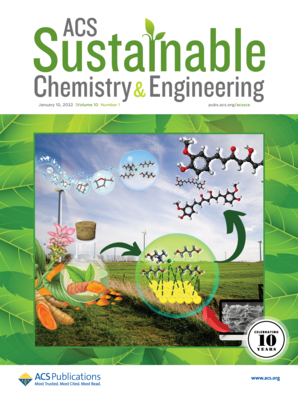Highly Stable Composite Phase-Change Materials Reinforced by Silica Aerogels and Cellulose Nanocrystals for Enhanced Thermal Insulation and Durable Isoperibolic Application
IF 7.1
1区 化学
Q1 CHEMISTRY, MULTIDISCIPLINARY
引用次数: 0
Abstract
The reduction in thermal conductivity of composite phase-change materials (PCMs) enhanced with silica aerogels (SAs) is garnering interest across various fields. However, the integration of SAs into substrates poses a challenge due to their high specific surface area and lightweight properties. In this research, we successfully developed a PCM reinforced with SA and cellulose nanocrystals (CNC) (paraffin wax (PW) @CNC/SA @poly(vinyl alcohol) (PVA), PW@CNC/SA@PVA). Here, renewable CNCs function as effective Pickering emulsifiers for encapsulating PW, while PVA acts as a binder, stabilizing the SA and maintaining its nanoporous integrity. The amphipathic nature of CNCs plays a crucial role in securely encapsulating PW with an impressive content of 63 wt %. The specific latent heat capacity of PW@CNC/SA@PVA was measured to be approximately 106 J/g. Remarkably, this material exhibited minimal leakage (about 2 wt %, over 2 h) at temperatures exceeding its melting point (60 °C). Additionally, the uniform dispersion of hydrophobic, porous SAs within the PVA solution imparts PW@CNC/SA@PVA with a unique blend of low thermal conductivity and ultralight properties. In a simulated scenario resembling sunlight exposure, the designed PW@CNC/SA@PVA demonstrates significant potential for long-term isoperibolic applications.由二氧化硅气凝胶和纤维素纳米晶体增强的高稳定性复合相变材料,可增强隔热性能并实现持久的等压应用
使用二氧化硅气凝胶(SAs)增强复合相变材料(PCMs)的导热性能,降低其导热性能的研究在各个领域都引起了人们的兴趣。然而,由于二氧化硅气凝胶的高比表面积和轻质特性,将其集成到基材中是一项挑战。在这项研究中,我们成功开发了一种用 SA 和纤维素纳米晶体(CNC)增强的 PCM(石蜡(PW)@CNC/SA@聚乙烯醇(PVA),PW@CNC/SA@PVA)。在这里,可再生 CNC 可作为有效的皮克林乳化剂封装 PW,而 PVA 可作为粘合剂稳定 SA 并保持其纳米多孔性。CNC 的两性性质在安全封装 PW 方面发挥了关键作用,其含量高达 63 wt%。经测量,PW@CNC/SA@PVA 的比潜热容量约为 106 J/g。值得注意的是,在超过熔点(60 °C)的温度下,这种材料的泄漏量极小(约 2 wt %,超过 2 小时)。此外,在 PVA 溶液中均匀分散的疏水性多孔 SA 使 PW@CNC/SA@PVA 具有独特的低导热性和超轻特性。在类似阳光照射的模拟场景中,所设计的 PW@CNC/SA@PVA 展示了长期等压应用的巨大潜力。
本文章由计算机程序翻译,如有差异,请以英文原文为准。
求助全文
约1分钟内获得全文
求助全文
来源期刊

ACS Sustainable Chemistry & Engineering
CHEMISTRY, MULTIDISCIPLINARY-ENGINEERING, CHEMICAL
CiteScore
13.80
自引率
4.80%
发文量
1470
审稿时长
1.7 months
期刊介绍:
ACS Sustainable Chemistry & Engineering is a prestigious weekly peer-reviewed scientific journal published by the American Chemical Society. Dedicated to advancing the principles of green chemistry and green engineering, it covers a wide array of research topics including green chemistry, green engineering, biomass, alternative energy, and life cycle assessment.
The journal welcomes submissions in various formats, including Letters, Articles, Features, and Perspectives (Reviews), that address the challenges of sustainability in the chemical enterprise and contribute to the advancement of sustainable practices. Join us in shaping the future of sustainable chemistry and engineering.
文献相关原料
公司名称
产品信息
阿拉丁
Ammonium persulfate (APS)
阿拉丁
Ferric chloride hexahydrate
 求助内容:
求助内容: 应助结果提醒方式:
应助结果提醒方式:


